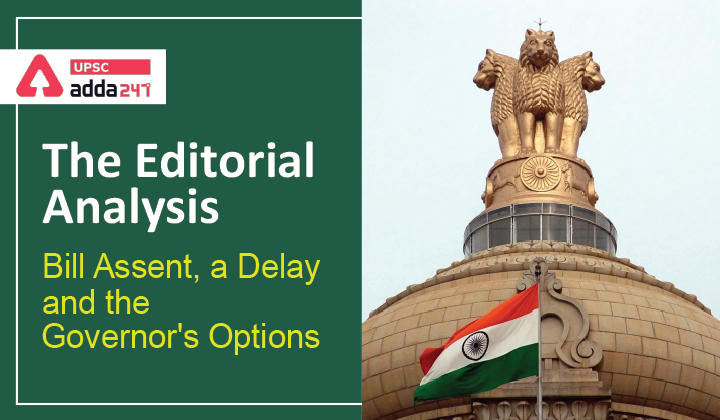Table of Contents
Relevance
- GS 2: Functions and responsibilities of the Union and the States, issues and challenges pertaining to the federal structure, devolution of powers and finances up to local levels and challenges therein.
Context
- Recently, Tamil Nadu is witnessing tussle between the elected government and the State Governor on the question of giving assent to the National Eligibility cum Entrance Test (NEET) Bill.
Key points
- Giving assent to the state Bills is a constitutional duty of the State governor, however, of late, this duty has become a source of confrontation between the two constitutional authorities.

Governor vis-à-vis council of ministers
- The Governor of a state is an appointee of the President.
- Article 154(1) of the Constitution vests in the Governor the executive power of the State, however, he is required to exercise that power in accordance with the Constitution. In other words, the Governor can act only on the aid and advice of the Council of Ministers.
- In Shamsher Singh vs State of Punjab (1974), the Supreme Court had clearly affirmed that the Governor is only a constitutional head and the executive power of the State is exercised by the Council of Ministers.
- Ambedkar, the chief architect of Indian constitution, explained in the Constituent Assembly that the Governor under the Constitution has no functions which he can discharge by himself.
- Later, the Sarkaria Commission restates this position and said that as long as the council of ministers enjoys the confidence of the Assembly, its advice, unless unconstitutional, must be deemed as binding on the governor.
- In 2016 again, a five-judge constitution Bench of the Supreme Court (the Nabam Rebia case) reaffirmed the above position on the governors’ powers in our constitutional setup.
Powers of the Governor with respect to Bills
- Article 200 of the Constitution provides for four alternative courses of action for a Governor when a Bill after being passed by the legislature is presented to him for his assent.
- The Governor can give his assent straightaway or withhold his assent.
- He may also reserve it for the consideration of the President, in which case the assent is given or withheld by the President.
- The fourth option is to return the Bill to the legislature with the request that it may reconsider the Bill or any particular provision of the Bill.
- The Governor can also suggest any new amendment to the Bill.
- When such a message is received from the Governor, the legislature is required to reconsider his recommendations quickly.
- However, if the legislature again passes the Bill without accepting any of the amendments suggested by the Governor, he is constitutionally bound to give assent to the Bill.
- In the case of NEET Bill, the Governor returned the Bill to the Assembly for reconsideration of the Bill. The assembly then passed it again and presented it to the Governor for his assent. He has not assented to the Bill so far.

What is the dispute?
- Some of the people is of the view that the Constitution has not fixed any time line within which to act.
- Since the Constitution has not fixed any time frame, the Governor can postpone a decision indefinitely.
- While it is true that Article 200 does not lay down any time frame for the Governor to take action under this Article, it is imperative on the part of the Governor to exercise one of the options given above.
- Although Article 200 does not say by what time the Governor should take the next step, it clearly states the options for him to exercise.
- It is obvious that if the Governor does not exercise any of those options he will not be acting in conformity with the Constitution because non-action is not an option contained in Article 200.
Conclusion
- Under Article 361, the President or a Governor is not answerable to any court for anything done in the exercise and performance of their powers and duties.
- But when a Governor does not take any decision on a Bill which is put up for his assent, he is not acting in consonance with his constitutional duties.
Read current affairs for UPSC
| National Behaviour Change Communication Framework for Garbage Free Cities Launched | NATGRID Campus Inauguration in Bengaluru | Farmer Distress Index | RBI Releases Report on Currency and Finance for FY2021-22 |
| Semiconductor Manufacturing in India: SemiconIndia Conference 2022 | Atal New India Challenge 2.0 Launched | Mandate Document for National Curriculum Framework Released | AQEES: Third Round of QES Report Released |
| India Plans Uniform Carbon Trading Market | Malaria Elimination by 2030 | Ways and Means Advances: RBI Lowers Limit for States | MSME Sustainable (ZED) Scheme Launched |
| Climate Resilient Agriculture: APEDA signs MoU with NRDC | Defence Connect 2.0 | Farm Loan Waiver in India: A Report by NABARD | Wildlife Protection Amendment Bill 2022: Parliamentary Panel Suggests Changes |



 TSPSC Group 1 Question Paper 2024, Downl...
TSPSC Group 1 Question Paper 2024, Downl...
 TSPSC Group 1 Answer key 2024 Out, Downl...
TSPSC Group 1 Answer key 2024 Out, Downl...
 UPSC Prelims 2024 Question Paper, Downlo...
UPSC Prelims 2024 Question Paper, Downlo...
